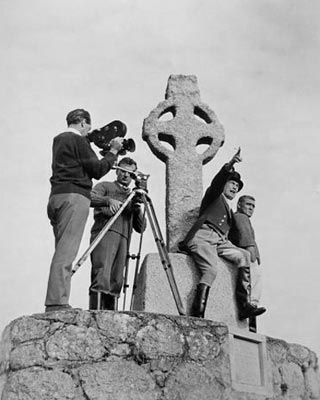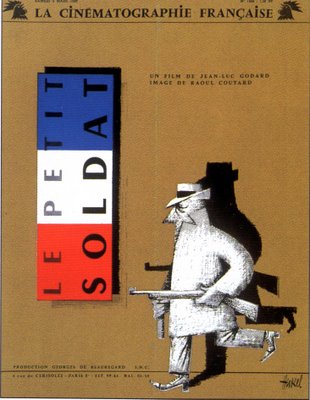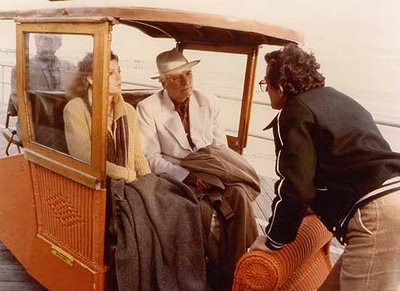
An insufferable film snob wanders off the beaten track, then comes back and talks about what he has seen.
Tuesday, August 29, 2006
Sunday, August 27, 2006
Moments of Distinction
And so, with no further ado….
The Film – Something Wild, dir. Jonathan Demme, 1986
The Set Up – Kooky Audrey (Melanie Griffith) has kidnapped uptight Charlie (Jeff Daniels) and taken him to her high school reunion. Charlie starts to relax and begins to have feelings for her. This moment starts during the dance, and the Feelies funky version of “Fame”. Charlie shows off his moves.
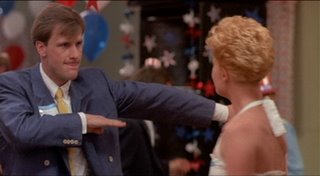
The walls are down. They kiss. The lights go down and the music changes to a slightly ominous guitar.
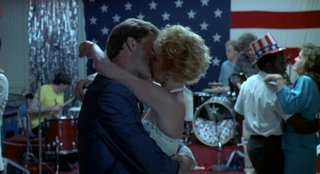
Note the black leather jacket on the left.
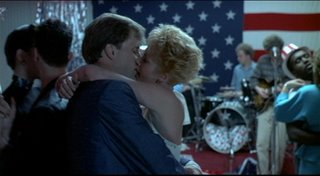
“Hi, baby. Surprised?”
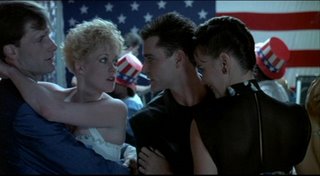
This is our first glimpse of Ray Liotta as Audrey’s husband Ray, and it is without any doubt my favorite movie entrance. The guy says three words, and the whole tone of the movie changes in that instant. Up till then, it has just been a screwy little romantic comedy. When Ray arrives on the scene, we know as soon as he opens his mouth that he’s trouble.
How many times have you seen the movies give us the girl with the louse in her life? Do you always wonder why she was with the guy in the first place? I do. Here, though, I don’t because Liotta gives Ray a very strong sexual magnetism along with the menace. You have to begrudgingly admit that a girl could fall for him.
Saturday, August 26, 2006
On this Date
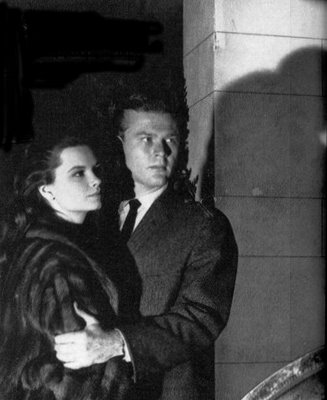
This one is a cheat – I’ll freely admit to that.
On this date in 1938, Susan Harrison was born. She was a fringe actress with only a handful of credits to her name. So why is she being featured here? Well, it’s like this – One of her roles was as Susan Hunsecker in Sweet Smell of Success, which is one of the coolest, smartest, and nastiest flicks ever to come down the turnpike.
Without intending to, I have been finding myself watching films written by Clifford Odets lately. The past couple of weeks have had me watching both Clash By Night and The Big Knife. An Odets script identifies itself quickly. His characters are quick on their feet, and they give you the impression that they’re gone out and lived a bit. A Odets character will be asked about women and reply “There’s room in the world for em”. Neat, huh?
This post is nominally about Susan Harrison, but in reality, it’s just an excuse to savor the dialogue in SSoS, the Big Daddy of all Odets screenplays.
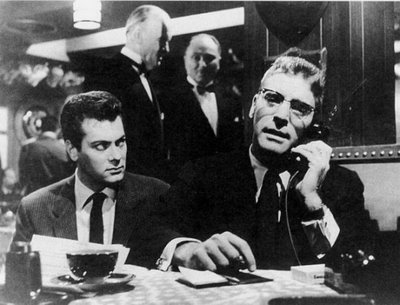
“I don’t relish shooting a mosquito with an elephant gun – Why don’t you shuffle along?”
“You’re dead, son. Get yourself buried.”
“The cat’s in the bag, and the bag’s in the river”
“From now on, the best of everything is good enough for me.”
Friday, August 25, 2006
Thursday, August 24, 2006
And Also Starring...
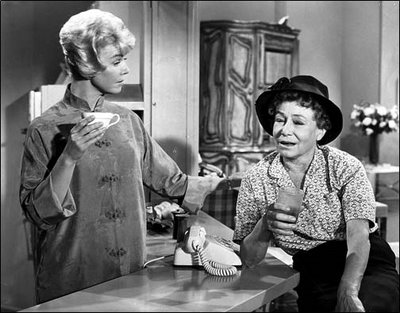 Doris Day and Thelma Ritter in Pillow Talk.
Doris Day and Thelma Ritter in Pillow Talk.
If one were to sit down and write about Thelma Ritter, it is inevitable that Rear Window would come up. Fair enough. It’s her most memorable part, and the role of Stella is vital to the film, although many people might not notice why.
You see, as the housekeeper/nurse to James Stewart’s voyeuristic photog, she’s the conscience – the voice in the background telling him that he should have better things to do than watch other people’s affairs. Everyone remembers the great Ritter line;
“People should go outside and look in at their own lives”
That’s the thing about the characters that she played. They were usually world-wise, and the people around her would have done well to listen up.
In Sam Fuller’s Pickup on South Street, her low-life informant Moe is the one who points Richard Widmark’s Skip towards the woman who could be his salvation. Ritter got one of her half-dozen Oscar nominations for this performance, and it’s her best. When you watch her quiet resignation as she prepares to die at the hands of the Commie villain, you see an entire lifetime of disappointment and sadness coalesce in a few moments. It’s film acting at its finest.
Then there are comic roles, such as Doris Days’ perpetually hung-over maid in Pillow Talk. She is underused in this one, but she makes the most of the screen time she does get. One of the funniest bits in the film is her drinking Rock Hudson under the table, and sure enough, giving him the correct romantic advice.
Thursday, August 17, 2006
Sunday, August 13, 2006
And Also Starring...
Whilst writing away on The Big Clock, I got to thinking about the great character actors. In the case of that movie, consider George MacCready, who plays Charles Laughtons’ icy second-in-command Steve Hagen.
MacCready is one of those faces that you see pop up all the time in secondary roles, and in a lot of cases, they are as memorable as the big names.
Think of Gilda, and Rita Hayworth’s cuckolded husband – That was MacCready. He was also the unscrupulous General Mireau in Paths of Glory. There were a ton of other lesser-known roles, usually as a cool-headed baddie, such as the underrated George Raft thriller Johnny Allegro.
In what will be a regular feature here at filmscreed, I will take a few moments to give props to some of these supporting players.
The Big Clock
The film stars Ray Milland as George Stroud, the editor of a crime magazine. Stroud is happily married, although he hasn’t been able to shake loose from work to go on a honeymoon yet. When we meet his boss, we understand why. The magazine mogul Earl Janoth (Charles Laughton) is a man who likes to be in control, and micromanages his life right down to the minute. This fact is given to us before we even lay eyes on Janoth. A tour group is asking questions about Janoth’s clock tower, and someone asks what happens when the clock stops. Stroud overhears and replies:
“Mr. Janoth would never allow that to happen.”
The film opens with the often-used trick of dropping us into the story and then looping back to tell us how we got there. In this case, Stroud is hiding out in the darkened corridors of the Janoth skyscraper. His voice-over wonders how he got here in just 36 hours, and the camera finds a calendar/clock on the wall – and dissolves to three days earlier. It’s corny but effective, and is completely in keeping with the clock theme of the film.
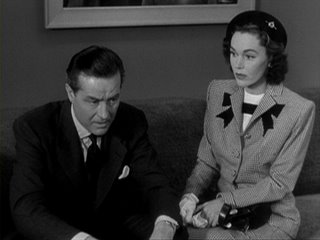
Janoth is visited early in the film by his mistress Pauline, and he is furious with her for using his private elevator to come up to his office. You see, it’s HIS elevator, and he can’t have someone else using it after he’s told her not to. She is clearly not happy with him, either, and says so.
Pauline soon finds herself sitting next to Stroud at a bar. She knows who he is, and the two of them talk about their common ground – Janoth. This scene is simply a set-up, but it establishes a bit about Stroud. Pauline is clearly flirting with him, and although he tells her that he is happily married, he doesn’t discourage her. He even agrees to an impromptu palm reading, and this is what is going on when his wife Georgette (Maureen O’Sullivan) walks into the bar. So, we see that Stroud is a quintessential Noir male – He should know better, but what the Hell.
The chill that Stroud got from his wife in the bar is amplified when Janoth then wants him to cancel his vacation to follow up on a hot story that is in the works. Stroud is having none of that, because this vacation was going to be the aforementioned honeymoon. He threatens to quit.
Stroud then gets a call in his office from a “palm reader”, and accepts an invitation for a drink from Pauline. Again, he does something that he must know is unwise. This time the one drink turns into several, and leads to a drunken search for a green clock and the purchase of a painting. Stroud wakes up the next morning on Paulines’ couch, having missed his vacation flight with his wife. The drunken binge has clearly not ended with sex, but what it has done is establish a trail, which will fuel the films brilliant corkscrew plot.
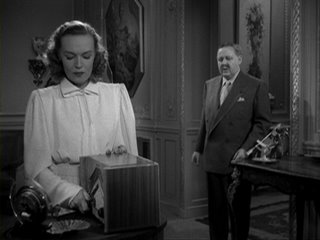
Pauline has to rush Stroud out the door when see sees Janoth coming, and the two men see each other in the hallway, although Janoth can’t tell who the other man is. He does, however, know that he came from Pauline’s apartment, and this leads to a violent confrontation between Janoth and Pauline. He rages on her for her sexual dalliances, and she turns it back to him
“Look at you!!!! Who would have you??”
The camera zooms to Laughton’s face as she screams at him, and the suggestion that he is physically unworthy causes him to snap. He kills her with a sundial bought by Stroud the night before.
Laughton is a marvel in this film, as he was in most of his films. Janoth is a man who wants to control things, and his obsession takes extreme forms. He has a man’s pay docked for leaving a light on. At a board meeting he says, “You have one minute to tell me how to get 50,000 new subscribers.” This man has a clock for a heart and would happily admit to it. The thing that sends him into a murderous rage is the suggestion that his sexual machinery is sub-par.
Now we come to where “TBC” really soars – The cat-and-mouse game between Janoth and Stroud. To recap – Stroud has spent the night with Janoth’s mistress. Janoth knows that someone has spent the night but not who. Janoth has killed the mistress. Stroud doesn’t know that she is dead. Janoth puts Stroud of his crime magazine on the path of the mystery man. This plot is brilliantly conceived, with the two men maneuvering right in plain sight of each other. I think that the ultimate compliment is this: It’s complicated, yet easy to follow.
The great Film Noirs were often characterized by a mood created through cinematography and set design, and this one is no exception. It was lensed by John Seitz, whose resume includes The Lost Weekend and Sunset Boulevard, and he has a great palette here. The Janoth building is one of the great locations, and the camera gives it a cold, impersonal feel, lingering on its hard right angles and sterile marble hallways.
If you haven’t seen the movie, I won’t spoil it for you, except to say that all the plot threads come together in a terrific manhunt through the Janoth building, and we come back full circle to where we started the film. Just like a clock.
Saturday, August 12, 2006
On this Date
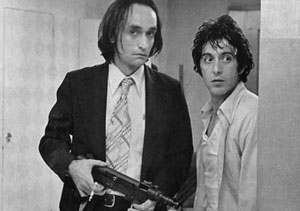 John Cazale’s life ended early. He was only 43 when he succumbed to cancer in 1978, and you might reasonably expect an actor with only five films to his credit to end up in the dustbin of history.
John Cazale’s life ended early. He was only 43 when he succumbed to cancer in 1978, and you might reasonably expect an actor with only five films to his credit to end up in the dustbin of history.
Cazale is much more than a footnote, however. The five films in question are: The Godfather, The Conversation, Godfather II, Dog Day Afternoon, and The Deer Hunter. An astounding batting average, wouldn’t you say?
He is best known, of course, as weak Fredo Corleone, who fumbled with his gun, betrayed the family, and ended up dead at the hands of his brother Michael. My own favorite Cazale role, however is as Al Pacino’s accomplice Sal in Dog Day Afternoon. Sal is a pretty dim bulb, but he has a touching naiveté, and his death in that film is absolutely heartbreaking.
John Cazale would have turned 71 today.


